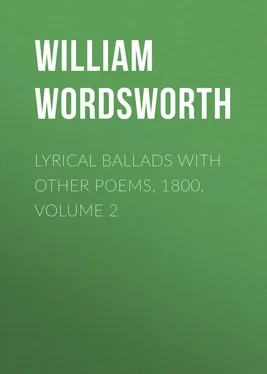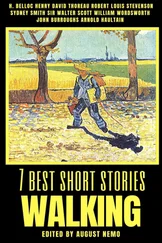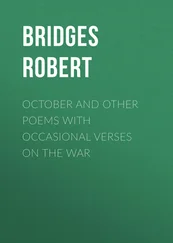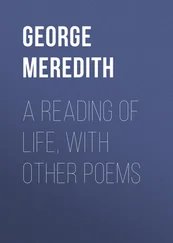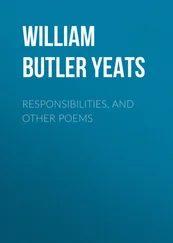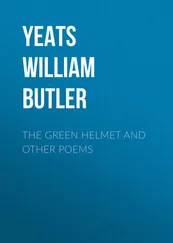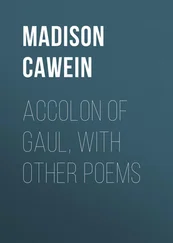William Wordsworth - Lyrical Ballads with Other Poems, 1800, Volume 2
Здесь есть возможность читать онлайн «William Wordsworth - Lyrical Ballads with Other Poems, 1800, Volume 2» — ознакомительный отрывок электронной книги совершенно бесплатно, а после прочтения отрывка купить полную версию. В некоторых случаях можно слушать аудио, скачать через торрент в формате fb2 и присутствует краткое содержание. Жанр: literature_19, Поэзия, foreign_prose, foreign_poetry, на английском языке. Описание произведения, (предисловие) а так же отзывы посетителей доступны на портале библиотеки ЛибКат.
- Название:Lyrical Ballads with Other Poems, 1800, Volume 2
- Автор:
- Жанр:
- Год:неизвестен
- ISBN:нет данных
- Рейтинг книги:4 / 5. Голосов: 1
-
Избранное:Добавить в избранное
- Отзывы:
-
Ваша оценка:
- 80
- 1
- 2
- 3
- 4
- 5
Lyrical Ballads with Other Poems, 1800, Volume 2: краткое содержание, описание и аннотация
Предлагаем к чтению аннотацию, описание, краткое содержание или предисловие (зависит от того, что написал сам автор книги «Lyrical Ballads with Other Poems, 1800, Volume 2»). Если вы не нашли необходимую информацию о книге — напишите в комментариях, мы постараемся отыскать её.
Lyrical Ballads with Other Poems, 1800, Volume 2 — читать онлайн ознакомительный отрывок
Ниже представлен текст книги, разбитый по страницам. Система сохранения места последней прочитанной страницы, позволяет с удобством читать онлайн бесплатно книгу «Lyrical Ballads with Other Poems, 1800, Volume 2», без необходимости каждый раз заново искать на чём Вы остановились. Поставьте закладку, и сможете в любой момент перейти на страницу, на которой закончили чтение.
Интервал:
Закладка:
Some say that here a murder has been done,
And blood cries out for blood: but, for my part,
I've guess'd, when I've been sitting in the sun,
That it was all for that unhappy Hart.
What thoughts must through the creature's brain have pass'd!
To this place from the stone upon the steep
Are but three bounds, and look, Sir, at this last!
O Master! it has been a cruel leap.
For thirteen hours he ran a desperate race;
And in my simple mind we cannot tell
What cause the Hart might have to love this place,
And come and make his death-bed near the well.
Here on the grass perhaps asleep he sank,
Lull'd by this fountain in the summer-tide;
This water was perhaps the first he drank
When he had wander'd from his mother's side.
In April here beneath the scented thorn
He heard the birds their morning carols sing,
And he, perhaps, for aught we know, was born
Not half a furlong from that self-same spring.
But now here's neither grass nor pleasant shade;
The sun on drearier hollow never shone:
So will it be, as I have often said,
Till trees, and stones, and fountain all are gone.
Grey-headed Shepherd, thou hast spoken well;
Small difference lies between thy creed and mine;
This beast not unobserv'd by Nature fell,
His death was mourn'd by sympathy divine.
The Being, that is in the clouds and air,
That is in the green leaves among the groves.
Maintains a deep and reverential care
For them the quiet creatures whom he loves.
The Pleasure-house is dust: – behind, before,
This, is no common waste, no common gloom;
But Nature, in due course of time, once more
Shall here put on her beauty and her bloom.
She leaves these objects to a slow decay
That what we are, and have been, may be known;
But, at the coming of the milder day,
These monuments shall all be overgrown.
One lesson, Shepherd, let us two divide,
Taught both by what she shews, and what conceals,
Never to blend our pleasure or our pride
With sorrow of the meanest thing that feels.
There was a Boy, &c
There was a Boy, ye knew him well, ye Cliffs
And Islands of Winander! many a time,
At evening, when the stars had just begun
To move along the edges of the hills,
Rising or setting, would he stand alone,
Beneath the trees, or by the glimmering lake,
And there, with fingers interwoven, both hands
Press'd closely palm to palm and to his mouth
Uplifted, he, as through an instrument,
Blew mimic hootings to the silent owls
That they might answer him. And they would shout
Across the wat'ry vale and shout again
Responsive to his call, with quivering peals,
And long halloos, and screams, and echoes loud
Redoubled and redoubled, a wild scene
Of mirth and jocund din. And, when it chanced
That pauses of deep silence mock'd his skill,
Then, sometimes, in that silence, while he hung
Listening, a gentle shock of mild surprize
Has carried far into his heart the voice
Of mountain torrents, or the visible scene
Would enter unawares into his mind
With all its solemn imagery, its rocks,
Its woods, and that uncertain heaven, receiv'd
Into the bosom of the steady lake.
Fair are the woods, and beauteous is the spot,
The vale where he was born: the Church-yard hangs
Upon a slope above the village school,
And there along that bank when I have pass'd
At evening, I believe, that near his grave
A full half-hour together I have stood,
Mute – for he died when he was ten years old.
THE BROTHERS, A PASTORAL POEM
1 1 This Poem was intended to be the concluding poem of a series of pastorals, the scene of which was laid among the mountains of Cumberland and Westmoreland. I mention this to apologise for the abruptness with which the poem begins.
These Tourists, Heaven preserve us! needs must live
A profitable life: some glance along
Rapid and gay, as if the earth were air.
And they were butterflies to wheel about
Long as their summer lasted; some, as wise,
Upon the forehead of a jutting crag
Sit perch'd with book and pencil on their knee,
And look and scribble, scribble on and look,
Until a man might travel twelve stout miles,
Or reap an acre of his neighbour's corn.
But, for that moping son of Idleness
Why can he tarry yonder ? – In our church-yard
Is neither epitaph nor monument,
Tomb-stone nor name, only the turf we tread.
And a few natural graves. To Jane, his Wife,
Thus spake the homely Priest of Ennerdale.
It was a July evening, and he sate
Upon the long stone seat beneath the eaves
Of his old cottage, as it chanced that day,
Employ'd in winter's work. Upon the stone
His Wife sate near him, teasing matted wool,
While, from the twin cards tooth'd with glittering wire,
He fed the spindle of his youngest child,
Who turn'd her large round wheel in the open air
With back and forward steps. Towards the field
In which the parish chapel stood alone,
Girt round with a bare ring of mossy wall,
While half an hour went by, the Priest had sent
Many a long look of wonder, and at last,
Risen from his seat, beside the snowy ridge
Of carded wool – which the old Man had piled
He laid his implements with gentle care,
Each in the other lock'd; and, down the path
Which from his cottage to the church-yard led,
He took his way, impatient to accost
The Stranger, whom he saw still lingering there.
'Twas one well known to him in former days,
A Shepherd-lad: who ere his thirteenth year
Had chang'd his calling, with the mariners
A fellow-mariner, and so had fared
Through twenty seasons; but he had been rear'd
Among the mountains, and he in his heart
Was half a Shepherd on the stormy seas.
Oft in the piping shrouds had Leonard heard
The tones of waterfalls, and inland sounds
Of caves and trees; and when the regular wind
Between the tropics fill'd the steady sail
And blew with the same breath through days and weeks,
Lengthening invisibly its weary line
Along the cloudless main, he, in those hours
Of tiresome indolence would often hang
Over the vessel's aide, and gaze and gaze,
And, while the broad green wave and sparkling foam
Flash'd round him images and hues, that wrought
In union with the employment of his heart,
He, thus by feverish passion overcome,
Even with the organs of his bodily eye,
Below him, in the bosom of the deep
Saw mountains, saw the forms of sheep that graz'd
On verdant hills, with dwellings among trees,
And Shepherds clad in the same country grey
Which he himself had worn. 2 2 This description of the Calenture is sketched from an imperfect recollection of an admirable one in prose, by Mr. Gilbert, Author of the Hurricane.
And now at length,
From perils manifold, with some small wealth
Acquir'd by traffic in the Indian Isles,
To his paternal home he is return'd,
With a determin'd purpose to resume
The life which he liv'd there, both for the sake
Of many darling pleasures, and the love
Which to an only brother he has borne
In all his hardships, since that happy time
When, whether it blew foul or fair, they two
Were brother Shepherds on their native hills.
– They were the last of all their race; and now,
When Leonard had approach'd his home, his heart
Fail'd in him, and, not venturing to inquire
Tidings of one whom he so dearly lov'd,
Towards the church-yard he had turn'd aside,
That, as he knew in what particular spot
His family were laid, he thence might learn
If still his Brother liv'd, or to the file
Another grave was added. – He had found
Another grave, near which a full half hour
He had remain'd, but, as he gaz'd, there grew
Such a confusion in his memory,
That he began to doubt, and he had hopes
That he had seen this heap of turf before,
That it was not another grave, but one,
He had forgotten. He had lost his path,
As up the vale he came that afternoon,
Through fields which once had been well known to him.
And Oh! what joy the recollection now
Sent to his heart! he lifted up his eyes,
And looking round he thought that he perceiv'd
Strange alteration wrought on every side
Among the woods and fields, and that the rocks,
And the eternal hills, themselves were chang'd.
Интервал:
Закладка:
Похожие книги на «Lyrical Ballads with Other Poems, 1800, Volume 2»
Представляем Вашему вниманию похожие книги на «Lyrical Ballads with Other Poems, 1800, Volume 2» списком для выбора. Мы отобрали схожую по названию и смыслу литературу в надежде предоставить читателям больше вариантов отыскать новые, интересные, ещё непрочитанные произведения.
Обсуждение, отзывы о книге «Lyrical Ballads with Other Poems, 1800, Volume 2» и просто собственные мнения читателей. Оставьте ваши комментарии, напишите, что Вы думаете о произведении, его смысле или главных героях. Укажите что конкретно понравилось, а что нет, и почему Вы так считаете.
